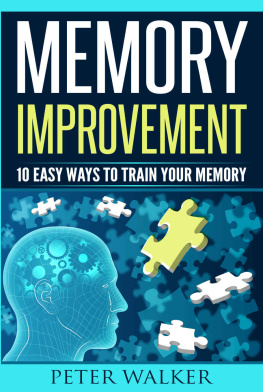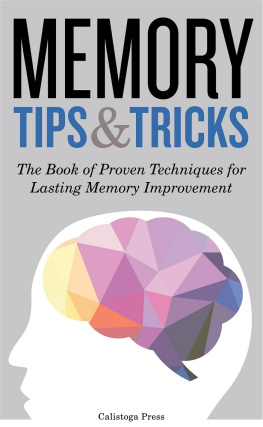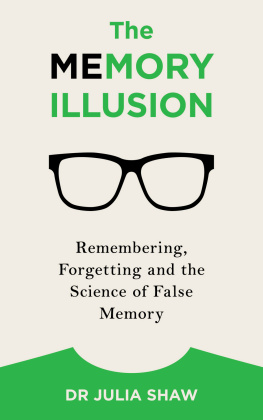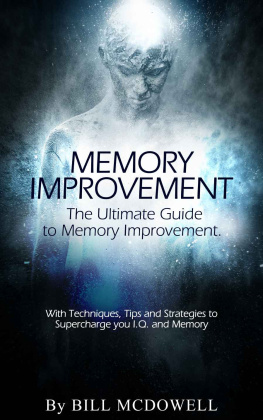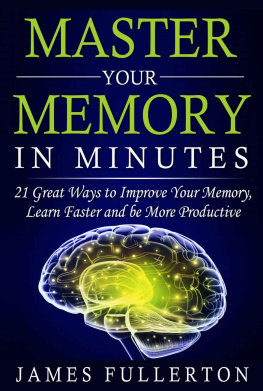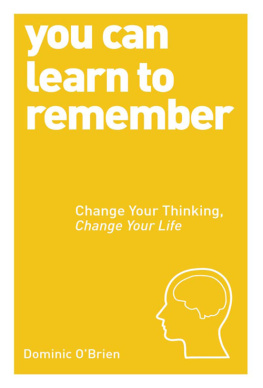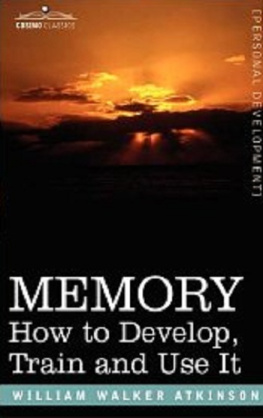Walker - Memory Improvement: 10 Easy Ways to Train Your Memory
Here you can read online Walker - Memory Improvement: 10 Easy Ways to Train Your Memory full text of the book (entire story) in english for free. Download pdf and epub, get meaning, cover and reviews about this ebook. year: 2016, genre: Romance novel. Description of the work, (preface) as well as reviews are available. Best literature library LitArk.com created for fans of good reading and offers a wide selection of genres:
Romance novel
Science fiction
Adventure
Detective
Science
History
Home and family
Prose
Art
Politics
Computer
Non-fiction
Religion
Business
Children
Humor
Choose a favorite category and find really read worthwhile books. Enjoy immersion in the world of imagination, feel the emotions of the characters or learn something new for yourself, make an fascinating discovery.
- Book:Memory Improvement: 10 Easy Ways to Train Your Memory
- Author:
- Genre:
- Year:2016
- Rating:4 / 5
- Favourites:Add to favourites
- Your mark:
- 80
- 1
- 2
- 3
- 4
- 5
Memory Improvement: 10 Easy Ways to Train Your Memory: summary, description and annotation
We offer to read an annotation, description, summary or preface (depends on what the author of the book "Memory Improvement: 10 Easy Ways to Train Your Memory" wrote himself). If you haven't found the necessary information about the book — write in the comments, we will try to find it.
Memory Improvement: 10 Easy Ways to Train Your Memory — read online for free the complete book (whole text) full work
Below is the text of the book, divided by pages. System saving the place of the last page read, allows you to conveniently read the book "Memory Improvement: 10 Easy Ways to Train Your Memory" online for free, without having to search again every time where you left off. Put a bookmark, and you can go to the page where you finished reading at any time.
Font size:
Interval:
Bookmark:
Memory Improvement
10 Easy Ways to Train You Memory
By
Peter walker
Table of Contents
Here is your free gift

Struggling with setting clear goals?
Here is your free solution for your planning problems . In this book you will find ways to start working faster and more effective toward your goals. You will learn that one of the most effective and simple way to planting a good seed in your subconscious is to write your goal. Writing your goal could seem primitive or outdated, but trust me try and it will work. If you are interested and to learn more click the link below and get your free gift NOW!
Introduction
I used to joke around with people that I had a memory like a sieve back then, if I was introduced to you, I would have forgotten your name before the end of our first conversation. And it wasnt just names either I would walk from one room to the next and forget what I went there for. I would write a shopping list before going grocery shopping and then forget to take the list with me.
The turning point for me came when I decided that I wanted to learn a little Italian because I was planning a trip to Rome you see, up until then, I hadnt really thought that my memory problem was serious, after all, my family thought it was a huge joke. Learning Italian did not come easy to me at all in fact, I was able to pick up a word here or there but whole sentences got forgotten very quickly. By the time I got to Italy, I could basically still only say Hello, Thank you and Good bye.
It was then that I realized that something had to change and so I started doing a lot of research into improving my memory and applying the techniques that I learned. And boy was I in for a surprise - I still go to the grocery store without my shopping list, but this time because I can memorize the list. I have since learnt all the names of all the cahiers in the shops that I visit at the mall, gas station, etc.
As for Italian, I also gave that another try and, whilst I would never be mistaken for a native Italian speaker, I can now conduct a passable conversation in that language.
What was most amazing to me was the tricks I learned were very easy to implement and that, once I started to do so, I started to see immediate results and the results were cumulative the more successes I had, the more confident I became in my own brains ability and the more I trusted it. The more I trusted it, the better I became at remembering things.
And that is the number one secret everyone should know no one has a bad memory! The problem is that you keep telling yourself that you do and so you do end up with difficulty remembering things. Think about it for a second if you had a child and you told them every day, You are no good at sports, it would not take long for them to believe you and then even give up trying. The same can be said about the brain if, like me, you have for years been telling your brain how useless it is, is it any wonder that it starts to believe it at a subconscious level and begins to make it true in your day to day life?
For me, the most shocking part of this journey was just how quickly I managed to pick up and apply these techniques and how quickly my memory improved. And that is why I decided to write this book I know that there are many people out there that think that they have terrible memories I am sure that you are one of them because you are reading this book.
The good news is that you are going to find out that your belief that you have a bad memory is wrong and I am going to prove it to you. This book is going to walk you through how your memory works, what causes your memory to fail, various tricks to help you remember things and how to put everything together so that you can unleash the full power of your memory.
Chapter 1: The Science of Memory How Your Memory Works
Now, the first thing that you need to remember (pardon the pun) is that your brain is assaulted by millions of stimuli on a daily basis basically the mind processes everything that we see, hear, taste, smell or touch in order to keep us save. That means that by the time you get to work in the morning, your brain has already processed thousands of specks of information.
It holds onto what it feels is important for you and starts to filter out the rest you simply do not need, nor want, to be able remember every single detail that the mind processes. In fact, scientists have posited that we only remember around about 1 in every 100 bits of information that we do receive. So details are seldom stored to our long-term memory unless our brains decide that they have some importance to us. Should the information be deemed important enough, the brain will actually start to remember it.
The Memory Process in Your Brain
The first step is for the brain to register the memory and encode it This aids recall at a later stage and is the reason that it is harder to remember the name of someone who has just been introduced to you. If you have not been paying proper attention in this instance, you will forget the name just as quickly.
The next step is for the brain to consolidate the memory basically grouping it with similar memories or associating it with something that is already familiar. The last step is when the brain retrieves the memory. This helps to reinforce the memory pathways and is one of the reasons why repeating things over and over again is such a good way to learn things.
A good analogy is a filing system with the brain being the filing clerk. The filing clerk first of all takes a look at the file, in order to see what it is about. The clerk will then decide where the appropriate place for the memory is grouping like memories with likes. Finally, at some stage the file will need to be retrieved for use. Now, lets say that the file is simply filed away and not used again. Over time, the filing clerk is likely to forget what the memory was about. If enough time elapses, the brain may even completely forget about the file or even where it was filed. This makes retrieval of such memories really difficult. If, on the other hand, the file is taken out often to be worked with, the brain is bound to remember the contents of the file and where it is filed so recall will be a whole lot easier.
Chapter 2: Breaking Bad Memory Habits There is No Such Thing as a Bad Memory
A lot of people argue with me about this one they bemoan their bad memories and insist that nothing could make them better. I love this because I know that I am going to prove them wrong. The good news is that anyone can improve their ability to recall things, even without using the tricks laid out in the following chapters. For the most part, the reason that we battle to recall things is more as a result of either lack of attention or not finding a way to store the information in a manner that makes sense to the brain.
In fact, problems with your memory are more likely to be about getting access to the information when you need it, rather than actually forgetting things. How many times have you tried to think of something on the spot, realizing that the answer is on the tip of your tongue, only to remember it later on when it is not really necessary anymore? In this chapter we will go through the bad memory habits and see what you can do to break them.
Lack of Concentration
This has to be the number one cause of memory problems and, considering how much information we do take in on a daily basis, it does come as no surprise. We simply do not concentrate enough on something unless we find it important.
Again, I can give a very good example here I used to be dreadful at remembering the names of people. The funny thing was that I could always remember the names of pets. It got so bad that I would recognize people as Spots owner I recognized them in connection with their pets.
Next pageFont size:
Interval:
Bookmark:
Similar books «Memory Improvement: 10 Easy Ways to Train Your Memory»
Look at similar books to Memory Improvement: 10 Easy Ways to Train Your Memory. We have selected literature similar in name and meaning in the hope of providing readers with more options to find new, interesting, not yet read works.
Discussion, reviews of the book Memory Improvement: 10 Easy Ways to Train Your Memory and just readers' own opinions. Leave your comments, write what you think about the work, its meaning or the main characters. Specify what exactly you liked and what you didn't like, and why you think so.

